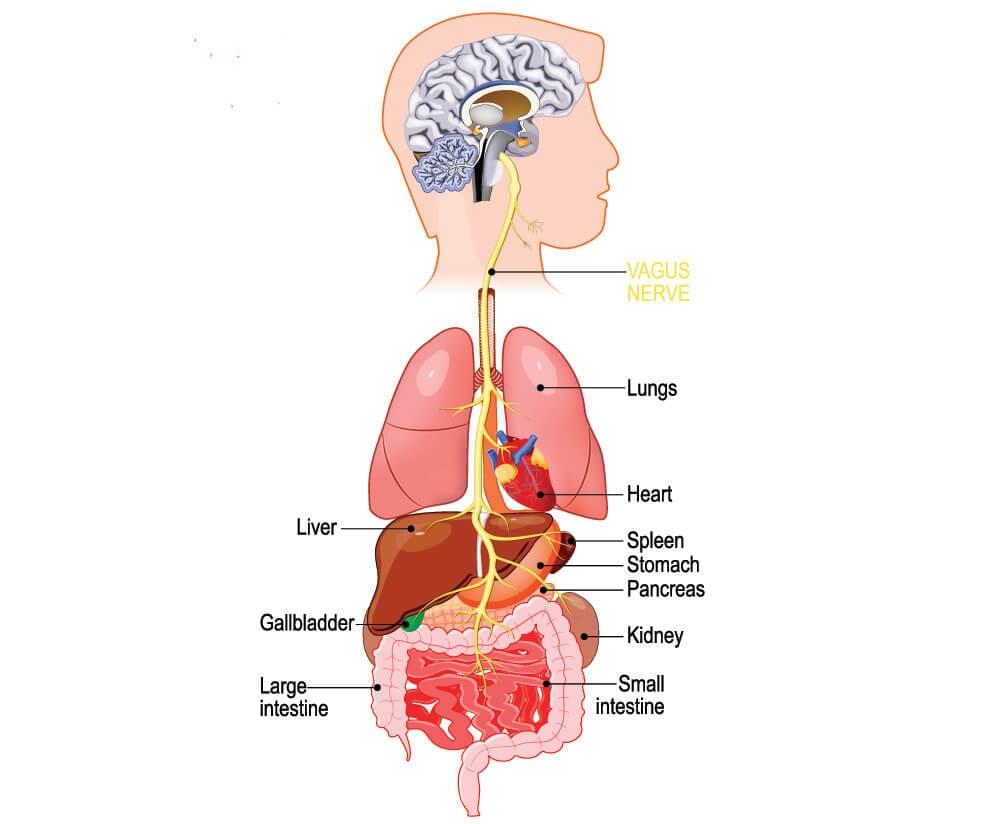A nasty comment leaves a "bad taste in our mouth."
When we fall in love, we get "butterflies in our stomach”.
When we have a hunch it’s referred to a “gut feeling” - or we “gut check” something by fully assessing it.
We have a “lump in our throat” when we are nervous or unable to speak. When we experience anxiety or regret, our “stomach is in knots”.
When someone shows nerve or bravery, they sure “have guts”.
THE GUT BRAIN CONNECTION
The gut-brain connection is a fascinating aspect of the microbiome. A troubled intestine can send signals to the brain, just as a troubled brain can affect the gut.
The gut microbiome communicates with the brain through neuroactive substances and the nervous system. In fact, 95% of the body's serotonin, a natural mood stabilizer, is found in the intestines. This highlights the importance of a healthy gut microbiome for reducing depression, regulating anxiety, and promoting better sleep.
These messages are sent to-and-fro via microbes that release substances. These substances leak into blood vessels & hormones that ride straight to the brain that are involved in everything from insulin production and digestion, to other hormones like melatonin & thyroid hormone). Next, these substances tap the vagus nerve, which is the high speed freeway to brain.
Picture the scene from Finding Nemo when Crush, Dory, and Nemo ride the the East Australian Current, or EAC. This EAC is the vagus nerve, and all the underwater creatures are these microbe substances!!
WHAT ARE THESE “MICROBES”?
We are all familiar with bacteria – some live on the sponge in your kitchen, some live on the meat that has gone bad in your fridge, and others live in the pond located just behind your house. Some rely on oxygen to survive, while others can simply live on metal, atoms, or acids.
Microbes are a combination of GOOD and BAD bacteria that have set-up-shop in your gut.
Your gut is kind of like a tubular, covered water slide for food, drinks, and nutrients…just without the smooth, hard plastic lining of a water slide! In fact, it’s full of divots and waves.

These divots along your gut are the perfect breeding ground for any type of bacteria - harmful or helpful. This is because they are protected from the huge rush of ground up food, water, and/or poop that’s shooting through your GI tract at any moment!
You can imagine a skier trapped in an avalanche that is seeking shelter behind a rock / bolder! The skier is the microbe / bacteria, and the snow is the ground up food, water, and/or poop.
Mulan & warriors ducking behind boulder during avalanche

With that in mind, majority of the microbes/bacteria in our gut “protect us simply by occupying spaces that would otherwise be free for harmful bacteria to colonize”. Essentially, these microbes put up “no vacancy” signs for any undigested food particles creeping around (From GUT by Julia Enders).
WHY CARE?
The gut microbiome's role in our well-being goes beyond digestion. It helps build molecules for digestion, protects against harmful microbes, and even influences our emotions. The microbes in our gut play a critical role in “colonization resistance”…which essentially just means that we should thank them for occupying spaces that would otherwise be available for harmful bacteria.
We want these divots or waves in our intestines to be occupied by EITHER helpful or harmless microbial bacteria because this means that they’re setting up cities which do not allow for other harmful bacteria to move into!
The gut microbiome plays a crucial role in our overall health, particularly during the first 1,000 days of life. It is especially important for children to have a healthy microbiome in their first two years as it can impact their long-term well-being. While adults can only minimally affect their gut microbiome, there are measures that can be taken to support its health.
FACTORS AFFECTING THE GUT
Several factors can affect the gut microbiome, including geographic origin, age, genetics, diet, alcohol and tobacco usage, prescription medication, physical activity, and sleep patterns.
To support gut health, it is recommended to prioritize nutrition and a diverse diet. Probiotic-rich foods like kimchi, sauerkraut, kombucha, miso, and tempeh can help introduce beneficial bacteria into the gut.
Prebiotics, found in foods like apples, asparagus, garlic, and leafy greens, serve as fuel for the growth of beneficial bacteria. It’s key to note that having the wrong mix of microbes (i.e.: not enough plant-based diet diversity OR over abundance of animal-fat diet) can derail that process…so, for all of my “creatures of habit”, it’s important to mix up your meals a little bit here and there!
To improve gut health, it is essential to
- establish boundaries with people who may increase stress
- prioritize adequate sleep
- engage in brain-stimulating activities: gardening, music, walking, puzzles, working out, etc.
- adopt a diverse and intuitive diet.
- Paying attention to how certain foods make you feel and listening to your gut's signals can guide your food choices.
In conclusion, the gut microbiome is a fascinating and complex ecosystem that influences various aspects of our health. From the gut-brain connection to its role in digestion and immune function, nurturing a healthy gut microbiome is vital for overall well-being. By understanding the factors that affect it and making informed choices, we can optimize our gut health and ultimately enhance our quality of life.
